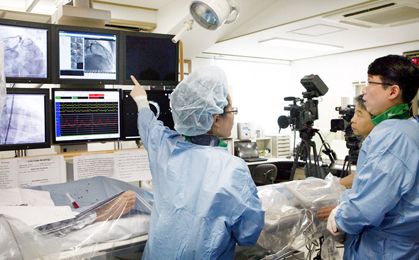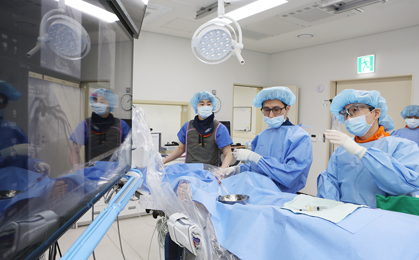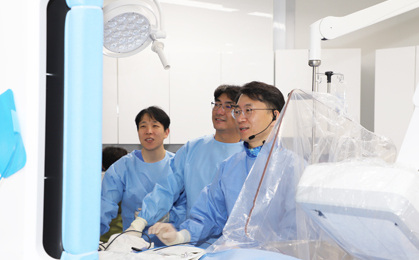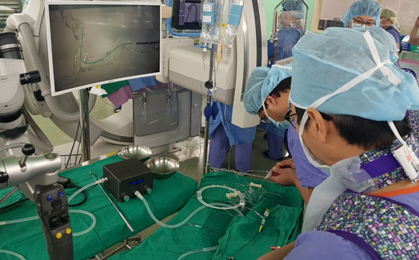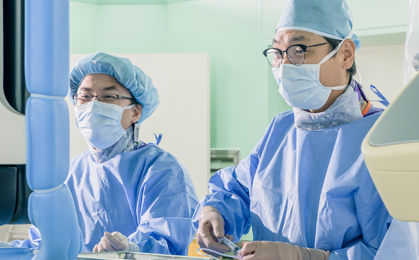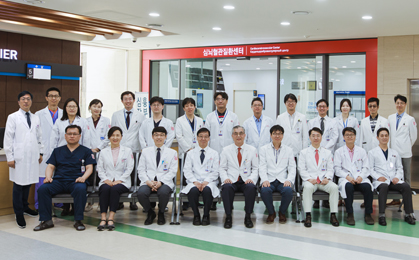Cardiovascular Disease Center
- Home
- About Department
- Specialized Centers
- Cardiovascular Disease Center
Cardiovascular Disease Center
DSMC's Heart Center was built for effective treatment of increasing heart diseases. The Cardiovascular Disease Center (CDC) is a specialized treatment facility in which staff of cardiology, thoracic surgery, pediatrics (pediatric cardiology), vascular surgery, anesthesiology, radiation oncology, radiology, and pathology join forces for intensive treatment of cardiovascular diseases.
The center provides acquired heart disease surgery (including coronary artery bypass graft, aorta surgery, and heart valve surgery) and congenital heart disease and arrhythmia surgery, giving hope and extended life to the patients.
DSMC CDC focuses on fast diagnosis and treatment of coronary artery diseases like angina pectoris and myocardial infarction, which are main causes of sudden death, and heart valve diseases, arrhythmia, hypertension, and hyperlipidemia.
Notably, the center performs about 10,000 cases of echocardiography, which is essential for diagnosing cardiovascular diseases. In addition, it is the first local hospital to provide coronary angiography (1985) and percutaneous coronary intervention (PCI), as well as heart transplant. The center has performed over 9,000 cases of balloon angiography, and stent insertion, 5,000 open-heart surgery operations, totalling over 26,000 cases of contrast surgery.
It is also active in diagnosing and treating arrythmia, which means the heart beats abnormally fast or abnormally slow. Normally, the heart beats 60 to 100 times per minute. And, when the heart rate is below 60, it is called bradycardia and, when over 100 per minute, tachycardia.
For the heart to beat, the muscles must contract, which requires electricity inside heart. For it, the heart has an internal electrical system that regularly generates electricity and sends electrical signals through out the entire heart. Arrhytmia occurs when thiere is a problem with electricity generation or delivery.
DSMC, for the first time in the region, introduced 3D electric physiologic test equipment and uses it actively for treating atrial tachycardia, ventricular tachycardia, post-surgical tachycardia and other different arrythmia cases. The electric physiological test is utilized for finding the cause of arrythmia and radiofrequency ablation for treating it. The latter has been performed over 2,000 times at DSMC, with over 97% success rate.
When there are symptoms of bradycardia, pacemaker must be implanted. For instance, if the patient experiences slowing heart rate and syncope, simultaneously, pacemaker implantation must be considered, because it can contract the heart when the heart rate drops and, thereby, prevent the patient from losing consciousness.
DSMC CDC regularly manages patients with pacemaker by deciding when to replace it and setting it appropriately.
As the first hospital that began offering pacemaker implant for te first time in the region in 1982, DSMC is giving hope to patients with bradycardia with the highest number of pacemaker operations and success rate in the Yeongnam Region.
One-Day Chest Pain Diagnosis Clinic
Sometimes, there is tightening or stinging sensation felt on the chest that spreads through the arms, neck, and shoulder.
These types of chest pain are mostly caused by coronary artery diseases, including hypertension, arrythmia, angina pectoris, and myocardial infarction, and, therefore, fast diagnosis and treatment are crucial.
DSMC Heart Center provides 'One-Day Chest Pain Diagnosis Clinic' for fast diagnosis and treatment of chest pain and is receiving positive response from the patients.
Some patients with myocardial infarction may not have pain, especially diabetic or elderly patients.
U-Health Monitoring Center
DSMC is actively engaged in providing ubiquitous health service via remote treatment in remote areas or at home.
From 3 years ago, the hospital developed U-Heart, which is electrocardiogram attached to the chest, and is currently the only medical institution to use it in the world at the moment. By using U-Heart, patients with cardiovascular diseases send their electrocardiogram via mobile phone so that the specialists can check it in real time. Patients in single rooms also benefit from U-Health monitoring linked to the nurse station, and the heart state of critical patients can be checked by the medical staff 24/7 via smartphone.
In 2009, the center is working with POSTEK to show results of their industry-academy-research collaboration. The two institutions are conducting a joint research project for U-Health, remote healthcare, next-gen intelligent medical system, ICT and medical science.
Furthermore, the hospital has built a healthcare clinic in Ulreungdo and telemedicine system in a barrack of Dokdo Guard so that the locals and guards can receive diagnosis and treatment from the general hospital.
DSMC's Division of Cardiology conducted free cardiology examination for over 500 Ulreungdo residents and Dokdo Guards,. Mr. Kim Seungdo, the only resident in Dokdo, was found via the remote diagnosis system, to have arrhythmia and stroke before he was quickly provided with medical treatment. Recently, the hospital built a system through which people with skin diseases can send an image of their skin by using a magnifying lens to their dermatologists.
Furthermore, DSMC has developed a digital medical record system (Full-EMR) for the first time in Korea, and introduced Full-PACs, leading advancement of medical IT.
Prof. Kim Yunnyeon of cardiology who also serves as the head of Keimyung University committee for biomedical information technology development, explained that, "To repay the love we received 100 years ago from foreign missionaries, we are planning to set up the telemedicine system in international branches of DSMC such Kazakhstan and Nepal," and that "the technology allows us to utilize our medical knowledge even in places that are far away from us."
Once the new hospital is built in Seongseo, DSMC will set up a radical IT system and, as a result, contribute to improving Daegu's reputation as a ‘Medi-City,' and activating the state-of-art medical complex.
Keimyung University Dongsan Hospital 1035, Dalgubeol-daero, Dalseo-gu, Daegu, Korea
Tel: 82-53-258-4001 Fax: 82-53-258-4009
COPYRIGHT (C) KEIMYUNG UNIVERSITY DONGSAN HOSPITAL. ALL RIGHTS RESERVED.

